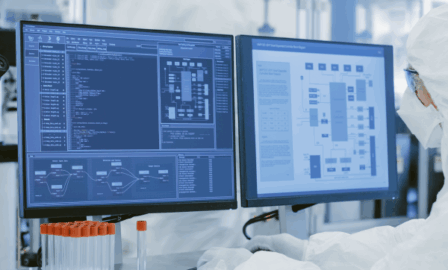Trends Report: Using Artificial Intelligence in Cell and Gene Therapies
The global market for personalized medicine is expected to reach $3.18 trillion within the next five years. While cell and gene therapy models present countless advantages for life science companies and their patients, there are a number of challenges in actualizing treatments for patients. Fortunately, the advent and evolution of artificial intelligence is well-timed to help life sciences companies meet and overcome these obstacles handily. Below, we outline four key trends demonstrating how businesses are using artificial intelligence in personalized medicine, including cell and gene therapy.
Download the Using Artificial Intelligence in Cell and Gene Therapies Trends Report
Using Artificial Intelligence in Cell and Gene Therapies
Trend #1: Making Sense of the Data
One of the significant advantages of AI systems is the ability to sift through and analyze copious amounts of data. Businesses in the life science industry, particularly personalized medicine providers, can derive major benefits from patient-related data, which is currently severely underutilized. The average individual is estimated to produce over 1 million gigabytes of health-linked data throughout their lifetime. However, genetic data’s high-dimension, low-sample-size form can make it difficult to manage.
The advent of machine learning in healthcare provides exciting possibilities for developers of precision therapies to make sense of patient-related data. One example comes from a study that used AI to analyze the genetic data of 800 Mayo Clinic patients, with hopes of assisting psychiatrists with prescribing anti-depressants. After processing each individual’s genetic data and health record, the algorithm predicted whether a particular drug would alleviate the patient’s symptoms with a 90% accuracy rate. Previously, the psychiatrists used a standardized method to prescribe depression-related medication which was accurate only 50% of the time. Ultimately, the ability of AI to process and analyze vast amounts of structured and unstructured data paves the way for many other opportunities within personalized medicine.
The average individual is estimated to produce over 1 million gigabytes of health-linked data throughout their lifetime.
Download the Using Artificial Intelligence in Cell and Gene Therapies Trends Report
Trend #2: Enhancing the Treatment
Through the analysis of vast amounts of patient-related data, AI can assist HCPs in their treatment efforts. Since personalized medicine tailor’s unique treatment to each individual patient, both diagnosis and treatment require a high degree of skill and precision. Therefore, machine learning models can provide immense support to HCPs by dissecting bountiful amounts of information and providing data-driven diagnoses for each patient. An example of this productive assistance was exhibited at the International Symposium on Biomedical Imaging, where participants developed algorithms to detect breast cancer in images of biopsies. As a result, combining an AI system with a HCP’s expertise increased the success rate of the diagnosis to 99.5%, reducing the human error by 85%.
Additionally, the growth of health apps and wearables will produce a myriad of patient-related data points over the next decade. Using AI to analyze this data can provide HCPs with a holistic understanding of patients’ health conditions and habits, i.e. diet, exercise, sleep. For example, a research team at Cardiogram used an AI neural network to analyze their patients’ wearable data to facilitate early detection of sleep apnea and atrial fibrillation. Both conditions were diagnosed with over 90% accuracy.
The combination of an AI system and HCP’s expertise increased the success rate of the diagnosis to 99.5%, reducing the human error by 85%.
Download the Using Artificial Intelligence in Cell and Gene Therapies Trends Report here.
Subscribe to Clarkston's Insights
Contributions by Andrei Volkov



